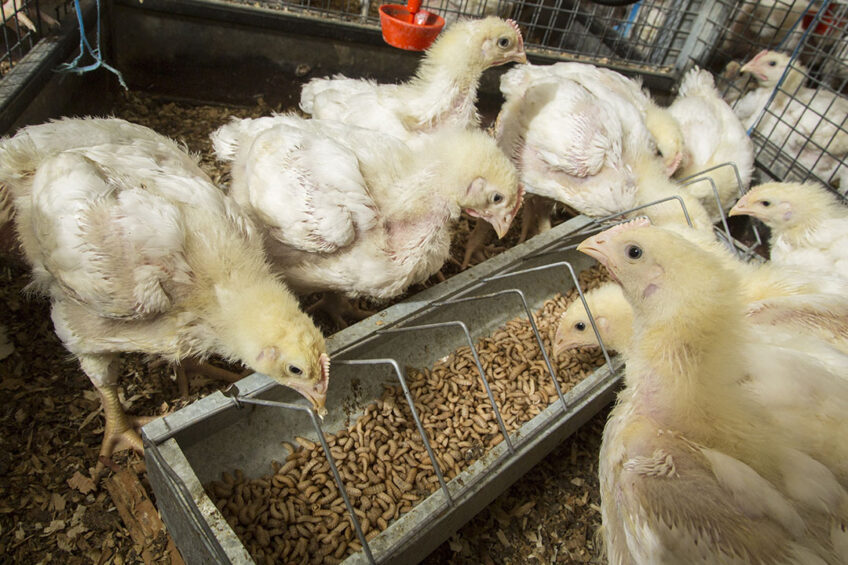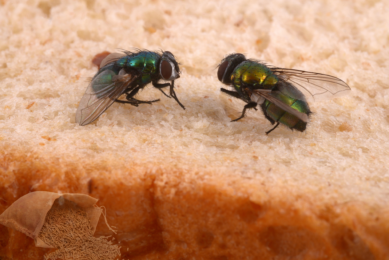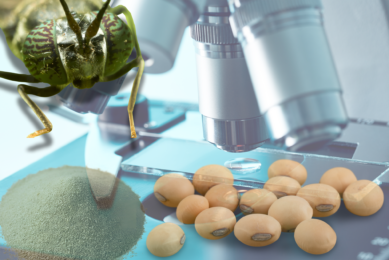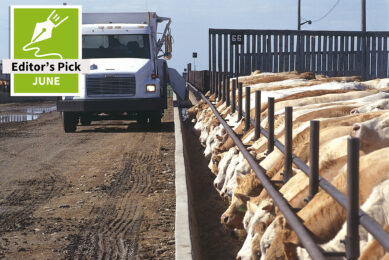UK retailer to replace soy with insects to cut carbon footprint

Insect ‘mini farms’ are to be established on 10 free-range egg farms by a major UK supermarket to provide natural food for free-range hens and cut soya use.
The insects will be fed on waste from Morrisons own fruit and vegetable site in Yorkshire, creating one of the UK’s first “circular waste” feeding schemes within the same company to produce food. Over 30 tonnes of fruit and vet waste will be recycled each week.
Carbon neutral eggs in 2022
Morrisons says the move will save 56 hectares of South American land from deforestation every year and remove 5,737 tonnes of CO2 as well as saving 40 billion litres of water annually. It is one of the measures being taken by the retailer to enable it to become the first supermarket to launch own brand carbon neutral eggs in 2022.
Reducing soya from livestock feed is one of the key challenges for farms needing to lower their carbon footprint and we wanted to help find a solution.
Supplementary diet of beans, peas & seeds
Cambridge-based start-up Better Origin insect ‘mini farms’ will be introduced onto the UK egg farms to feed the hens, who will also receive a supplementary diet of British beans, peas and sunflower seeds. The ‘mini farm’ containers, in which millions of insects are kept, will provide nutrient rich and natural food for the hens.
Future plans for carbon neutral fruit, veg & meat
Soy currently accounts for 10-20% of hens’ normal diets. Up to 70% of the emission from the UK’s supply chain is attributed to feed, of which soya is a major contributor. Morrisons expects the first carbon neutral eggs to arrive on its shelves next year, which will be followed by carbon neutral options for fruit, vegetables and meat as part of its commitment to be supplied only by net zero British farms by 2030.
Respectful Eggs
The announcement comes just a few weeks after Stonegate Farmers launched its carbon neutral Respectful Eggs in J Sainsbury stores, where hens are given soy-free feed, made of locally milled field beans, including lupins, mung beans and peas.
Achieving net zero is a massive challenge that needs collaboration and determination and we hope this is the year that more food providers and producers taken meaningful action.
Insect units
The insect units have been developed by agritech company Better Origin. Each container can help feed 32,000 free-range hens and will receive 3 tonnes of waste fruit and vegetables each week. The insects can grow to 5,000 times their initial body mass in less than 14 days. Collectively, the 10 containers will feed 320,000 free-range hens.
An insect diet could suit our hens better – they seem to enjoy it – and the nutritional and added health benefits are notable.
Insect feed improves bird health & welfare
Insects are a natural part of birds’ ancestral diets and wild birds seek out insects as they forage. Studies by Better Origin and the Universities of Bristol and Turin have found that insect feed improves bird health and welfare. The insects are nutritious and rich in essential amino acids and healthy fats. They have no impact on the quality, taste or shelf live of the hens’ eggs.
Morrisons comments
Sophie Throup, Morrisons Head of Agriculture, said: “Reducing soya from livestock feed is one of the key challenges for farms needing to lower their carbon footprint and we wanted to help find a solution. An insect diet could suit our hens better – they seem to enjoy it – and the nutritional and added health benefits are notable. We’re also finding a good home for our fruit and veg waste. We think this could be part of the future of egg farming.”
Better Origin comments
Fotis Fotiadis, CEO and Founder of Better Origin, added: “We are delighted to be working with Morrisons to decarbonise their food supply chain and reduce soya reliance. Our vision is for the initial roll-out to scale across all 60 Morrisons egg farms which would reduce around 35-40,000 tonnes of CO2 equivalent per year. The company’s on-site insect farms reduced transportation needs and maintained nutrition of the black soldier fly larvae fed to the hens.
“Achieving net zero is a massive challenge that needs collaboration and determination and we hope this is the year that more food providers and producers taken meaningful action.”
In September, the EU approved the use of insect proteins in poultry and pig feed, on top of use as fish feed.











